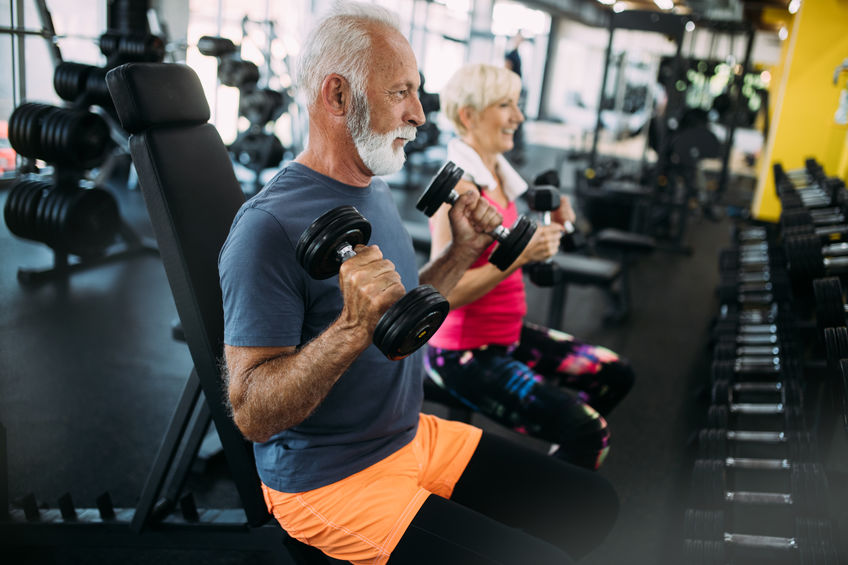By John Salak –
Hair isn’t the only thing that tends to disappear with age. Muscle mass also kind of evaporates as the years roll on. Maybe it’s inevitable – or maybe there’s a way to stop or at least slow muscle mass going up in smoke. Several recent studies indicate that protein is a key to the muscle-loss solution, but they quickly note that certain proteins are better than others and balanced consumption is critical.
Researchers at Kings College in London, for example, didn’t mince words when they told The Physiological Society that on a gram-for-gram basis, animal proteins are more effective than plant proteins in supporting skeletal muscle mass as individuals age. The British study came in response to the growing number of vegans in Great Britain and the limited research to date on the impact of vegan diets on the elderly.
Losing muscle mass is a critical issue as people age. In general, it occurs among middle-aged and older adults because they often experience a reduction in muscle proteins being built from amino acids. These acids, in turn, come from proteins people consume and the amount of exercise they perform.
The King’s College research focused exclusively on the impact of soy and wheat proteins compared to consuming animal proteins and found that older adults need to consume significantly larger amounts of these plant proteins to maintain the same muscle mass that comes from a smaller amount of animal protein.
“Simply transitioning from an animal-based protein diet to a plant-based diet, without adjusting total protein intake, will likely to be detrimental to muscle health during aging. A more balanced and less extreme approach to changing dietary behavior, meaning eating both animal and plant-based proteins, is best,” the study noted.
Researcher Oliver Witard acknowledged that the study only compared two plant-based proteins in soy and wheat and that further work needs to be done on other plant proteins such as oat, quinoa and maize to get a complete comparative picture.
Another British study provided a new wrinkle to the muscle-loss picture by claiming balancing protein consumption is another critical factor. The University of Birmingham found that aging adults who better balanced their protein intake by eating more at breakfast and lunch helped maintain their muscle mass with age.
Birmingham researchers noted that in general older adults tend to consume more protein in the evening at dinner than earlier in the day and that this uneven consumption thwarts the body’s mechanism for producing more muscle. This imbalance is particular harmful for older people because their internal mechanisms become less efficient with age, which means they need to consume more protein than young people to generate the same muscle-building results.
“We know that older people show a blunted response to muscle building when consuming a certain amount of protein. Therefore, older individuals need to eat more protein to get the same muscle building response as younger and middle-aged people,” explained Dr. Benoit Smeuninx, the study’s first author. “Another way to help muscles make better use of dietary protein is to perform regular exercise.”
The Birmingham research focused on 120 individuals broken down into three different age groups. The results went beyond these new insights to note that customization is essential to maintaining muscle mass as people age.
“Most people are reaching the Recommended Daily Allowance of protein, but our results show that a one-size-fits-all guideline for protein intake isn’t appropriate across all age groups,” Smeuninx explained. “Simply saying older people should eat more protein isn’t really enough either. We need a more sophisticated and individualized approach that can help people understand when and how much protein to consume to support muscle mass.”
Effective protein consumption isn’t the only element that mature adults need to maintain muscle mass. They also have to exercise. And yet another study from the University of Birmingham found that it is never too late to get started on building muscle.
In fact, Birmingham researchers claim that older people who have never undertaken a sustained exercise program have the same exact ability to build muscle as “highly trainer master athletes” of the same age.
The results came as a surprise for researchers who assumed the master athletes would be better able to build and maintain muscle mass given their superior level of physical fitness.
“Our study clearly shows that it doesn’t matter if you haven’t been a regular exerciser throughout your life, you can still derive benefit from exercise whenever you start,” lead researcher, Dr, Leigh Breen, reported. “Obviously a long-term commitment to good health and exercise is the best approach to achieve whole-body health, but even starting later on in life will help delay age-related frailty and muscle weakness.”
Breen advised that older adults need much more guidance on strength training than is currently available, but with this in hand, they could generate significant benefits from a sustained program no matter their age.
The bottom line? Eating more proteins in a balanced fashion while embracing strength training clearly has the potential to redefine the term Grey Panthers.












